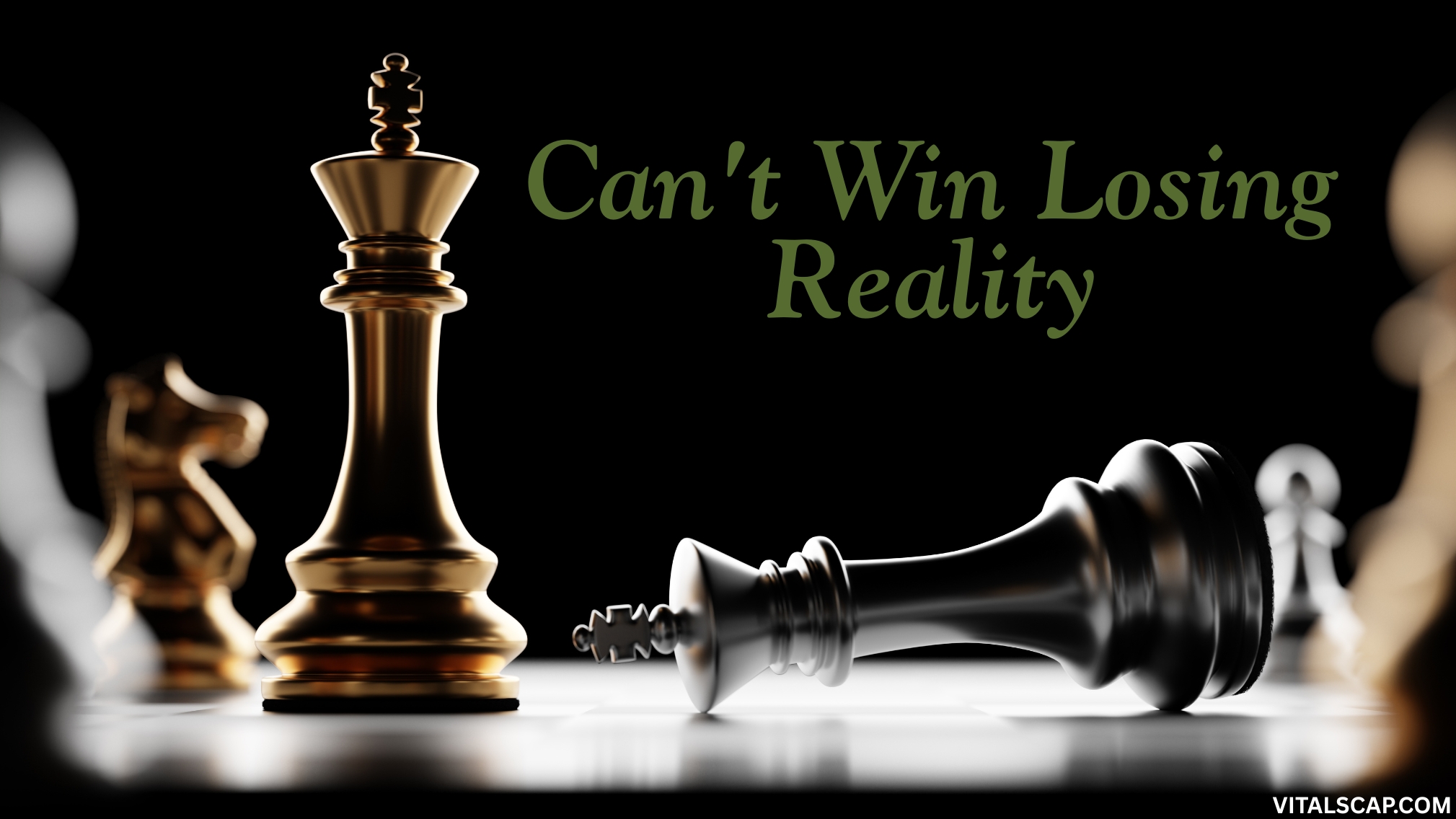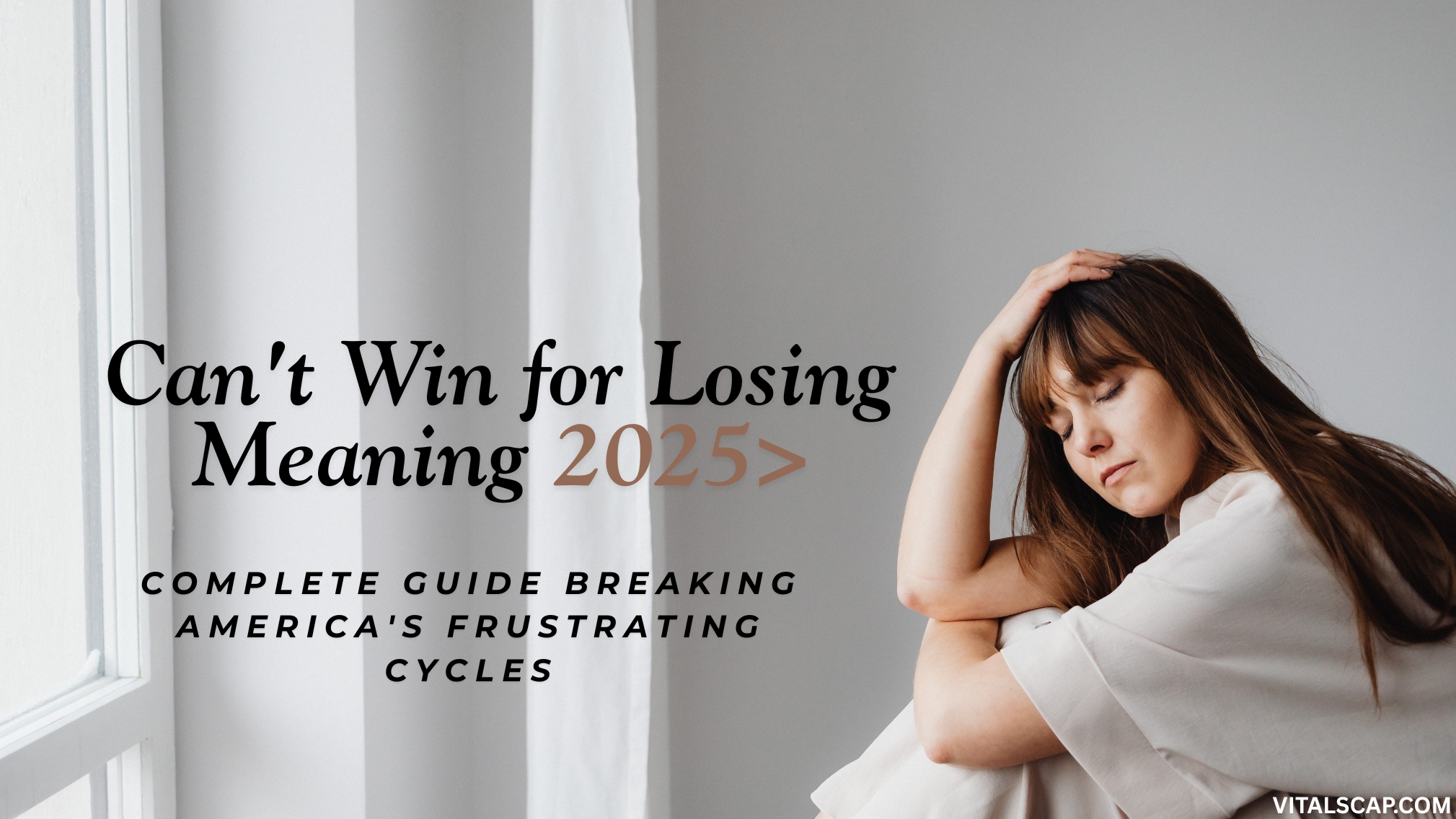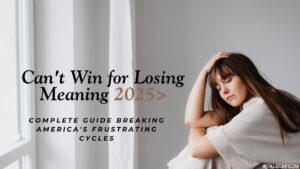In 2025, over 73% of Americans report feeling trapped in endless cycles of setbacks. There’s a powerful idiomatic expression that perfectly captures this modern predicament of failure despite one’s best efforts. The phrase “can’t win for losing” has become more relevant than ever in our digital age.
This English idiom describes those maddening moments when every attempt to improve your situation backfires spectacularly. You’re not just experiencing bad luck; you’re caught in a vicious cycle where losses actively prevent victories. Understanding that you can’t win for losing can transform how you handle life’s curveballs.
When someone says they “can’t win for losing,” they’re describing situations where setbacks compound themselves relentlessly. It’s that domino effect where one misfortune triggers another, creating seemingly endless cascades of unlucky situations. This figure of speech validates universal human experiences while pointing toward potential solutions.
Can’t Win Losing Reality

Modern Americans increasingly find themselves living this colloquial expression daily. The phrase represents more than just common idioms; it captures the essence of contemporary struggle. Social media amplifies every mistake, turning minor setbacks into major misfortune.
Economic pressures create cascading problems where job loss triggers housing instability, which prevents securing new employment. This creates perfect examples of failure despite effort. The harder people try, the worse their situations become. It’s a psychological trap disguised as bad luck.
Dr. Sarah Mitchell, behavioral psychologist at Stanford University, explains:
“This phrase represents a cognitive pattern where individuals become trapped in self-reinforcing negative cycles. Recognition is the first step toward breaking free.”
Can’t Win Losing Meaning
This idiomatic expression describes the vicious cycle where losses actively prevent victories. The phrase explanation reveals a logical paradox: how can losing actually stop you from winning? The answer lies in understanding cascading consequences and psychological momentum.
Linguistic experts classify this as a figure of speech that combines irony with practical truth. When you’re caught in unlucky situations, each setback creates conditions that make the next failure more likely. Its failure despite effort at its most frustrating.
Professor James Rodriguez from Harvard Linguistics Department notes: “This English idiom demonstrates how language evolves to capture complex emotional and situational realities that standard vocabulary cannot adequately express.”
| Aspect | Traditional Bad Luck | Can’t Win for Losing |
| Duration | Temporary setbacks | Ongoing cycles |
| Impact | Single incidents | Compounding effects |
| Recovery | Natural bounce back | Requires intervention |
| Psychology | External attribution | Pattern recognition |
Origin Can’t Win Losing
The expression origin traces back to the 1960s horse racing circuits. Jockeys faced a brutal reality: they only earned money for first-place finishes, not lesser positions. This created the perfect environment for this English language idiom to emerge naturally.
Racing culture provided the ideal context where coming in second or third literally meant you “couldn’t win for losing.” The financial structure of the sport made this colloquial expression a lived reality for countless jockeys struggling to make ends meet.
Documentation shows the phrase appeared in the Postal Supervisor journal in 1955, though it gained widespread popularity through gambling culture and regional spread from racing tracks to mainstream America. The linguistic development reflects broader cultural shifts in how Americans processed disappointment.
Examples Can’t Win Losing

2025’s digital landscape creates unprecedented unlucky situations. Cancel culture represents modern misfortune where single mistakes trigger endless punishment cycles. Social media algorithms compound problems, burying recovery attempts under waves of negative feedback.
Economic warfare manifests through housing crises, where eviction prevents job stability. Bad credit blocks opportunities, creating gig economy traps with inconsistent income. These scenarios demonstrate textbook failure despite effort where trying harder actually makes things worse.
Real-life scenarios include career catastrophes where job loss triggers financial avalanches. Health disasters create medical bills that generate stress-induced illness. One relationship argument can destroy years of trust-building. These examples show how this figure of speech applies to modern American life.
Points of Recognition:
- Financial setbacks are preventing job searches
- Health problems are creating more health problems
- Social mistakes amplified by digital platforms
- Educational debt is blocking career advancement
- Housing instability is preventing employment stability
Psychology Behind Can’t Win
Neuroscience research reveals how stress compounds decision-making abilities during unlucky situations. The brain’s threat-detection system becomes hyperactive, creating confirmation bias that expects failure despite effort. This psychological state actually increases the likelihood of continued misfortune.
Cognitive loops develop when people internalize this English idiom as their personal reality. The interpretation of idioms affects behavior patterns, creating self-fulfilling prophecies. Mental traps ensure continued bad luck through unconscious behavioral changes that sabotage success attempts.
Dr. Lisa Chen, neuropsychologist at UCLA, observes: “When individuals adopt this linguistic framework, they unconsciously adjust their risk tolerance and decision-making patterns in ways that perpetuate the very cycles they’re trying to escape.”
Breaking Patterns:
- Recognize early warning signals
- Interrupt negative thought cycles
- Seek an external perspective
- Document pattern occurrences
- Challenge cognitive assumptions
Victory Strategies Against Cycles
Pattern recognition mastery begins with identifying early warning signals during unlucky situations. Successful intervention requires stopping dominoes mid-fall before bad luck streaks gain momentum. Mental reset methods help move beyond this figure of speech mentality into actionable problem-solving modes.
Tactical breakthrough approaches include circuit breakers that create deliberate pauses during misfortune. Support network activation becomes crucial when failure despite effort requires external assistance. Resource reallocation involves smart pivoting strategies that redirect energy toward winnable battles instead of futile efforts.
Expert Recommendations:
- Create “pause protocols” before major decisions
- Develop diverse support networks
- Practice resource flexibility
- Implement timing strategies
- Build resilience reserves
Cultural Impact on American Society
Music and media have embraced this English language idiom extensively. Famous can’t win for losing lyrics appear in Grateful Dead’s “Cumberland Blues” and Teddy Pendergrass’s song titles. Hollywood references demonstrate how this colloquial expression captures universal human experiences through entertainment media.
Regional variations show different usage in conversation across geographic areas. Generational gaps reveal how the interpretation of idioms varies by age groups. Professional contexts apply this phrase explanation to workplace dynamics, while social media evolution transforms traditional sayings into can’t win for losing meme culture phenomena.
Notable Cultural References:
- Blues music tradition
- Country music themes
- Hip-hop adoption
- Comedy routines
- Literary expressions
Breaking Free From Cycles
Recognition represents the first step toward liberation from can’t-win-for-losing patterns. Awareness of these cycles allows for strategic intervention before bad luck compounds into insurmountable challenges. Understanding this English idiom provides the vocabulary needed to discuss and address these complex situations effectively.
Strategic approaches require patience and systematic thinking rather than desperate attempts that often worsen unlucky situations. Building resilience through diverse approaches prevents over-reliance on single solutions that might fail. Creating support systems provides an external perspective when internal judgment becomes compromised by misfortune.
Implementation Timeline:
| Week | Focus Area | Action Items |
| 1-2 | Pattern Recognition | Document incidents, identify triggers |
| 3-4 | Support Building | Connect with mentors, join groups |
| 5-6 | Strategy Testing | Try small interventions, measure results |
| 7-8 | System Refinement | Adjust approaches, build consistency |
Digital Age Challenges
Social media platforms amplify can’t win for losing scenarios through algorithmic punishment systems. One mistake can trigger a viral misfortune that follows individuals indefinitely. Cancel culture represents extreme examples where recovery becomes nearly impossible due to digital permanence and mob mentality dynamics.
Information overload creates paralysis, where too many solutions generate decision fatigue. Algorithm bias can bury recovery content while promoting negative narratives. Understanding these 2025 realities helps people navigate modern unlucky situations with greater awareness and strategic thinking.
Digital Solutions:
- Curate positive content feeds
- Limit news consumption
- Practice digital detox regularly
- Build offline communities
- Create content buffers
Economic Manifestations Today
Housing crises create perfect examples of this figure of speech where eviction prevents job stability, which prevents securing housing. Credit score spirals demonstrate how financial bad luck compounds exponentially. Gig economy traps leave workers unable to plan effectively due to income inconsistency.
Medical bankruptcies show how health problems create financial problems that create more health problems. Student debt can prevent career advancement that would help pay off student debt. These economic realities make this English idiom more relevant than ever for American families.
Economic Intervention Points:
- Emergency fund building
- Credit repair strategies
- Income diversification
- Healthcare planning
- Housing stability programs
Relationship Pattern Recognition
Trust cycles in relationships demonstrate how one argument can trigger defensive behaviors that create more arguments. Communication breakdown follows predictable patterns where attempts to fix problems create additional problems. Understanding these dynamics helps couples recognize when they’re living this colloquial expression.
Family systems can perpetuate can’t win for losing patterns across generations. Childhood trauma creates adult behavioral patterns that generate the very misfortune individuals are trying to avoid. Therapeutic intervention helps break these inherited cycles through awareness and skill development.
Relationship Recovery:
- Practice active listening
- Implement cooling-off periods
- Seek professional mediation
- Address underlying trauma
- Build communication skills
Health and Wellness Applications
Stress-induced illness creates perfect examples where health problems generate more health problems. Chronic pain can lead to depression, which reduces self-care, which increases pain levels. Sleep deprivation affects decision-making, leading to choices that further disrupt sleep patterns.
Mental health stigma can prevent people from seeking help, allowing problems to compound until they become overwhelming. Medication side effects sometimes create new health issues while treating existing ones. Understanding these patterns helps healthcare providers and patients work together more effectively.
Health Intervention:
- Stress management techniques
- Regular healthcare monitoring
- Lifestyle modification planning
- Support group participation
- Professional counseling access
Professional Career Applications

Workplace dynamics often reflect can’t win for losing patterns where efforts to improve performance backfire due to office politics or unrealistic expectations. Career pivots can fail when timing or market conditions create additional challenges rather than opportunities for advancement.
Skill development sometimes leads to increased responsibilities without corresponding compensation increases. Networking efforts can appear desperate or self-serving, damaging professional relationships instead of building them. Professional burnout creates performance issues that jeopardize job security.
Career Strategies:
- Strategic skill development
- Mentor relationship building
- Industry trend monitoring
- Personal brand management
- Work-life balance maintenance
Understanding you can’t win for losing meaning transforms frustration into recognition and hope. This figure of speech validates universal struggles while pointing toward systematic solutions. You’re not trapped in unlucky situations forever. Awareness breaks bad luck cycles through pattern recognition and strategic intervention.
Start identifying your misfortune patterns today. Stop letting failure despite effort create more losses through unconscious behavioral cycles. America’s most resilient people understand this idiomatic expression and use it as a springboard for comeback stories. Your victory begins with recognizing the cycle, then systematically dismantling it through patience, strategy, and community support.
Frequently Asked Questions
What’s the meaning of the phrase ‘I can’t win for losing’?
This idiomatic expression describes situations where setbacks compound themselves, making success impossible because failures prevent victories through cascading misfortune and failure despite effort.
What’s the origin of the phrase ‘I can’t win for losing’?
The you can’t win for losing origin traces to 1960s horse racing circuits, where jockeys only earned money for wins, not placing second or third.
What are some notable uses of the phrase ‘I can’t win for losing’?
Famous can’t win for losing lyrics include Grateful Dead’s “Cumberland Blues” and Teddy Pendergrass’s song title, capturing this English idiom in popular culture.
What does “can’t win for trying” mean?
A can’t win for losing synonym emphasizing effort futility, where harder trying creates worse outcomes in unlucky situations and increased failure despite effort.
Can you win from losing?
Yes, by recognizing this figure of speech patterns, learning from misfortune, and strategically breaking cycles, one can prevent success through systematic intervention and pattern disruption.
What does “can’t win for losing” mean in Urban Dictionary?
Can’t win for losing. Urban Dictionary defines it as “things would be going great for you if they weren’t going so badly.”
When you can’t accept losing you can’t win?
This concept suggests that refusing to acknowledge failures prevents learning and adaptation, requiring movement beyond this colloquial expression through acceptance of temporary setbacks.
Conclusion
Understanding “can’t win for losing meaning” transforms frustration into recognition and hope. This figure of speech validates universal struggles while pointing toward systemic solutions. You’re not trapped in unlucky situations forever. Awareness breaks bad luck cycles through pattern recognition and strategic intervention.
Start identifying your misfortune patterns today. Stop letting failure despite effort create more losses through unconscious behavioural cycles. America’s most resilient people understand this idiomatic expression and use it as a springboard for comeback stories. Your victory begins now.
More Post:

Passionate about innovation and growth. Dedicated to managing, optimizing, and creating seamless experiences while supporting diverse content and users with professionalism and clarity every day.








